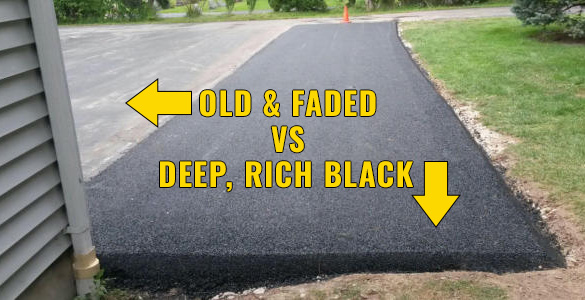Lasting Results: Asphalt Patch Repair Through Accuracy Sealing
Wiki Article
Cold Mix Asphalt Vs. Hot Mix Asphalt: Which Is Right for You?

Composition Distinctions
Cold mix and hot mix asphalts differ considerably in their make-up, with unique features that influence their performance and applications. Cold mix asphalt is created by emulsifying the asphalt binder with water and an emulsifying agent before mixing it with aggregate. This method enables for the asphalt to be workable at lower temperature levels, making it excellent for short-term repair services and for use in colder weather. Warm mix asphalt, on the various other hand, is produced at heats, usually between 300-350 ° F, which helps to accomplish better compaction and an extra resilient end product. The warm mix asphalt production procedure includes warming the aggregate and asphalt binder separately prior to integrating them at the asphalt plant.
In addition, cool mix asphalt tends to be less thick and a lot more adaptable than warm mix asphalt. This adaptability makes it far better fit for areas with greater levels of movement, such as driveways or roadways with heavy website traffic. In contrast, warm mix asphalt is understood for its high longevity and resistance to rutting and splitting, making it a recommended choice for highways and high-traffic roadways where long life is important.
Installation Refine Differences
The process of mounting cold mix and hot mix asphalt displays significant differences in their demands and treatments. Cold mix asphalt, being a more flexible product, can be used directly from the bag or container onto the hole or damaged area. It calls for marginal preparation work, such as cleaning up the location and compacting the chilly combine with hand devices. This makes it a convenient alternative for short-term and quick fixes. On the other hand, hot mix asphalt demands a more fancy setup process. It includes warming the combination to heats before laying it down on a correctly prepared base. The preparation consists of condensing the base, applying a tack coat, and utilizing hefty equipment like pavers and compactors for a resilient and smooth finish. As a result of the heating requirements, hot mix asphalt installments are typically lugged out by experts with customized devices, guaranteeing an extra long-term and structurally sound outcome.Longevity and Long Life Aspects
When considering asphalt choices, resilience and long life are important factors to examine for long-term sidewalk performance,. Warm mix asphalt (HMA) is recognized for its phenomenal longevity and durability. The high temperatures throughout the mixing read the full info here and laying process allow for far better compaction, causing a denser and stronger sidewalk framework. This leads to HMA being extra Click This Link immune to rush hour loads, harsh weather, and the effects of aging compared to cool mix asphalt (CMA)
In terms of longevity, HMA normally outmatches CMA due to its exceptional toughness and resistance residential or commercial properties. HMA pavements have a longer solution life, requiring less frequent repairs and maintenance, which can equate to cost savings in the lengthy run. Furthermore, HMA pavements are a lot more easily personalized to satisfy details job needs, further enhancing their durability.
Expense Considerations
Thinking about the financial ramifications is a critical facet when reviewing the option in between hot mix asphalt (HMA) and chilly mix asphalt (CMA) for sidewalk projects. While the preliminary price of warm mix asphalt is generally higher than that of cold mix asphalt, HMA frequently provides a more cost-effective option in the long run due to its remarkable resilience and long life.In enhancement to product expenses, it's necessary to think about the expenses connected with installment and maintenance when comparing HMA and CMA. Eventually, the decision in between HMA and CMA must take right into account not simply the preliminary price yet also the long-lasting monetary implications to figure out the most cost-efficient choice for the certain pavement task.
Environmental Influence Comparison
Contrast of the environmental effects in between hot mix asphalt (HMA) and cold mix asphalt (CMA) exposes unique distinctions in sustainability methods. HMA manufacturing needs heats, leading to raised power consumption and greenhouse gas exhausts. The process also releases unstable organic compounds (VOCs) and harmful air contaminants (HAPs) right into the ambience. On the other hand, CMA is generated and used at lower temperatures, reducing energy use and discharges considerably. The lower production temperatures of CMA result in lowered gas consumption and reduced degrees of carbon dioxide discharges, making it a more eco-friendly option.Furthermore, the use of CMA usually involves reusing existing asphalt pavement, promoting source conservation and reducing the amount of waste sent out to garbage dumps. By opting for CMA over HMA, road building and construction jobs can add favorably to ecological conservation efforts.
Verdict
To conclude, the choice in between cold mix asphalt (CMA) and warm mix asphalt (HMA) depends on numerous factors such as make-up, installment procedure, longevity, long life, cost, and environmental effect. asphalt repair. While CMA offers a quick and cost-efficient service for minor repair work, HMA makes certain remarkable durability and long life for rush hour areas. Take into consideration these click here to find out more factors carefully to establish which sort of asphalt is the right choice for your paving requires

Considering the financial implications is a critical element when assessing the option in between warm mix asphalt (HMA) and cold mix asphalt (CMA) for sidewalk projects. While the first cost of hot mix asphalt is typically higher than that of cold mix asphalt, HMA typically gives a much more cost-effective remedy in the long run due to its remarkable durability and longevity. asphalt patch repair.Contrast of the environmental effects in between hot mix asphalt (HMA) and cold mix asphalt (CMA) reveals distinctive differences in sustainability techniques.In final thought, the selection between cool mix asphalt (CMA) and hot mix asphalt (HMA) depends on different variables such as composition, setup procedure, resilience, durability, expense, and environmental effect
Report this wiki page